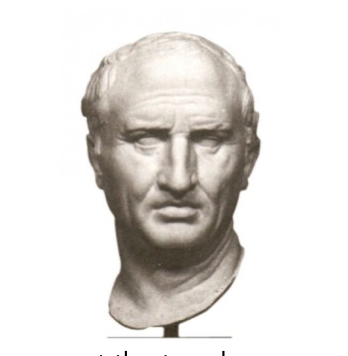Introduction to Cicero’s Laelius De Amicitia
 Marcus Tullius Cicero (106–43 BCE) was a Roman orator, statesman, and thinker whose powerful speaking and prose style became the de facto model for all future Latin prose writers (and western prose stylists in general into the 19th century). Cicero lived through the most tumultuous period of Roman political history in the middle of the first century BCE, as Rome transitioned from a republican form of government controlled by aristocratic Senators to the autocratic rule of a single emperor. In addition to his work as a legal advocate and a politician, Cicero was a prolific writer of philosophical dialogues and treatises, making the ideas of Greek philosophers more accessible to a Roman audience. Due in large part to his refusal to support the trend toward autocracy, Cicero was killed in 43 BCE as part of a political deal between the young Octavian (the future emperor Augustus) and Marc Antony. His tongue and hands were cut off and nailed to the speaker’s rostrum in the Roman forum.
Marcus Tullius Cicero (106–43 BCE) was a Roman orator, statesman, and thinker whose powerful speaking and prose style became the de facto model for all future Latin prose writers (and western prose stylists in general into the 19th century). Cicero lived through the most tumultuous period of Roman political history in the middle of the first century BCE, as Rome transitioned from a republican form of government controlled by aristocratic Senators to the autocratic rule of a single emperor. In addition to his work as a legal advocate and a politician, Cicero was a prolific writer of philosophical dialogues and treatises, making the ideas of Greek philosophers more accessible to a Roman audience. Due in large part to his refusal to support the trend toward autocracy, Cicero was killed in 43 BCE as part of a political deal between the young Octavian (the future emperor Augustus) and Marc Antony. His tongue and hands were cut off and nailed to the speaker’s rostrum in the Roman forum.
Seven of our readings in Chapter I come from Cicero’s philosophical dialogue Laelius de amicitia, a work composed very late in the orator’s life, around 44 BCE, and dedicated to his very good friend Atticus, with whom he maintained a life-long correspondence, much of which we still have. While it is technically a dialogue—the approved format for philosophical discussions since the time of Plato—the De Amicitia is really more of a monologue. All of the selections you will be reading, in fact, are spoken by a prominent Roman senator (of a generation earlier than Cicero’s) named Gaius Laelius.
Laelius was the father-in-law of one of Cicero’s early teachers, Mucius Scaevola, and the dialogue purports to be Scaevola’s remembrance of a conversation he had with his father-in-law. Cicero probably picked Laelius as his main speaker in this dialogue due to his well-known friendship with the very eminent Scipio Aemilianus, the famous Roman general who won the Third Punic War in 143 BCE and died in 129 BCE (under mysterious circumstances).
That all sounds complicated, doesn’t it? But the main point is that Cicero has provided his (Roman) readers with a trustworthy and respectable “expert” on friendship in the figure of Laelius, from an earlier (and therefore, to the Roman mind, better!) generation. The selections we will be reading are drawn from the last two thirds of the dialogue, in which Laelius defines what friendship actually is, as well as with whom one ought to be friends (and with whom one should not). There is a strong emphasis on the idea of “virtue” and the advantages that come from being friends with a “good” (i.e., “virtuous”) man. Laelius is skeptical—as were many Romans, including Cicero—about the more theoretical approaches to friendship found in some branches of Greek philosophy. But generally, he believes that nature (or Nature) has provided humans with friendship as an aid to achieving virtue, the highest goal for humans.

